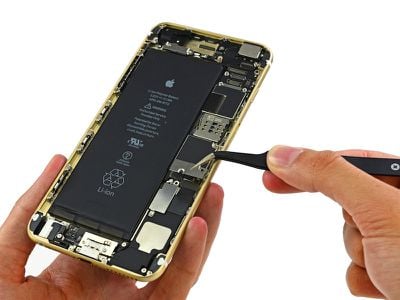Lawmakers in Nebraska, Minnesota, New York, Massachusetts and Kansas have introduced legislation aiming to legalize "Right to Repair" rules for electronic devices, including Apple's iPhone, reports Motherboard. The laws would require manufacturers to sell replacement parts to independent repair shops and customers, and force them to make service and diagnostic manuals public.

The bills are aimed at diluting the "authorized repair" model that most tech products subscribe to, making electronic device repair more similar to the car repair. The legislation is modeled after the Motor Vehicle Owner's Right to Repair Act, which passed in Massachusetts in 2012. That law effectively became national legislation as auto manufacturers didn't want to bother dealing with different legislation in each state.
The legislators behind the New York bill say that authorized repair shops result in "high repair prices and high overturn of electronic items." Additionally, many independent repair shops end up purchasing parts from Chinese grey markets or taking parts from recycled electronics to compete. This results in raids from the Department of Homeland Security as the independent shops end up unknowingly selling counterfeit parts.
Apple currently runs the Apple Authorized Service Provider Program, which allows companies to obtain Apple-genuine parts, reimbursement for repairs covered by Apple's warranties, a performance-based bonus program, on-the-spot technical service, comprehensive repair information, inclusion on Apple's website and more. However, the program requires businesses to allow Apple to review financial records, maintain high levels of customer service, establish a credit line with Apple and agree to promote the Apple brand and AppleCare. It also does not include individual customers who may want to repair their devices on their own.
The bills are being pushed by Repair.org, a lobbying firm representing independent repair shops. Repair.org tells Motherboard that it is focusing its effort on the New York bill since it's being considered for the third year and even had momentum last year until lobbyists from groups backed by Apple and other manufacturers stepped in to kill the legislation.





















Top Rated Comments
With documentation, independent repair shops can fix many problems that Apple won't or won't do economically. For example, my 17" MBP died. Apple quoted me nearly $1000 to repair. I managed to get board and circuit schematics and traced the problem to a tiny surface mounted capacitor. It literally cost me $0.25 to replace it. Just this week Apple quoted my cousin $1200 for a logic board replacement. I traced the problem to liquid damage in the keyboard causing the SMC_ONOFF to short. Literally a $23 repair. Without documentation there is no sane way to trace problems and identify/test/repair. In just two examples here, I showed savings of almost $2200 off what Apple Service quoted simply because I had documentation.
Apple clearly has financial motivation to hinder any means for independent repairs. The irony is that Apple does not even seem to use the documentation that it hates to share. They make no attempt to actually repair faulty parts (they throw them out and install whole new part). And with the trend towards ever more integrated components (i.e. soldered SSDs), it is going to get far more expensive to do repairs with Apple.
It would not be impossible to implement. The car industry found a way to do it.
Here is the damn 2.5V 330µF capacitor that aroused so much of your suspicion. And yes, this single stupid part prevented the entire computer from powering on (it sits in a circuit that kicks "up" the power when power state changes).